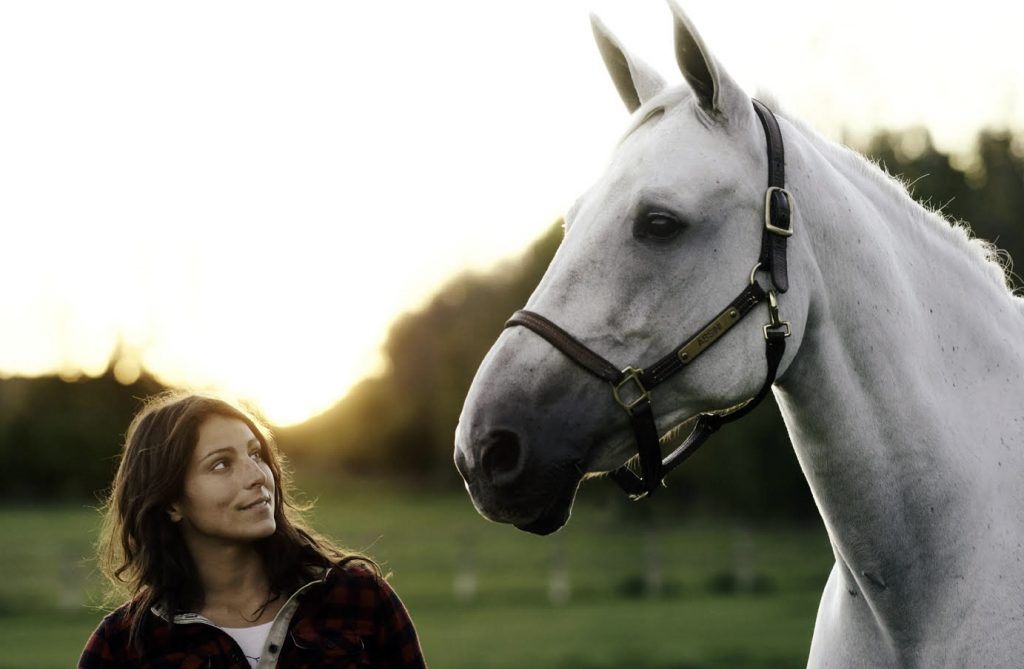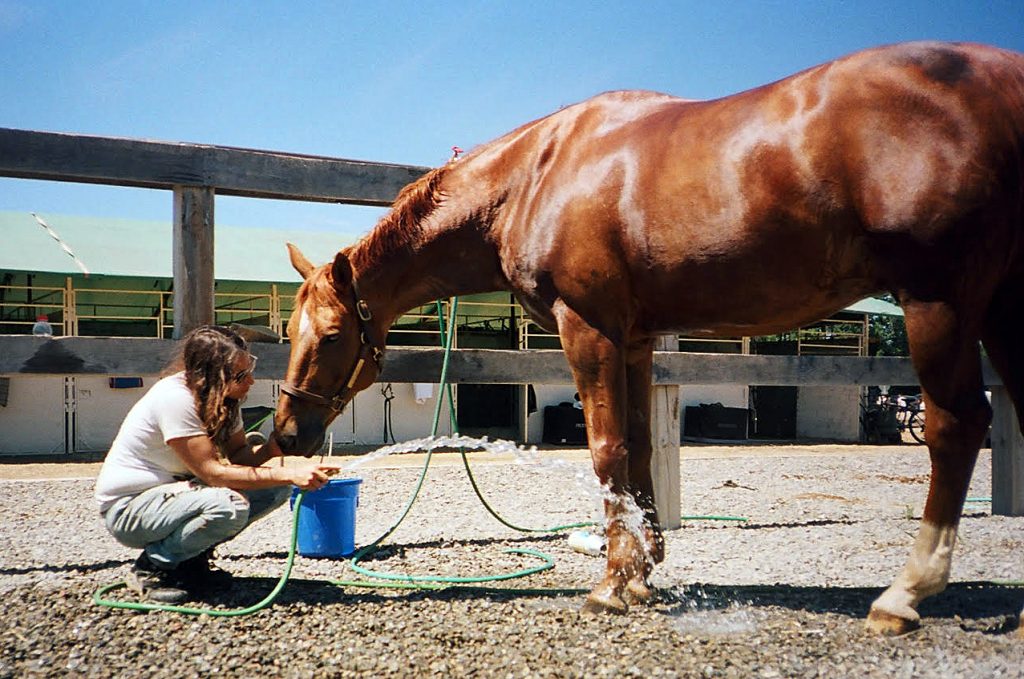Smith: Homeless to helping at-risk youth
(Editor’s note: The following story contains challenging material some readers may find hard to digest culled from a frank discussion with interview subject Charlotte Smith)
ORLEANS – Charlotte Smith came from Scarborough, North Yorkshire England at 12-years-old filled with the hope of a new life in Dunrobin with her long-lost mother.
The fairy tale never emerged though, as Smith’s life quickly devolved to a lengthy period of homelessness, sex work, petty crime and drug addiction.
But that would not be the final chapter, as Smith’s love of horses; work ethic instilled by life on the farm; and a desire to help those facing similar challenges, has Smith working through her master’s degree in sociology at Carleton University; working as a peer researcher; and volunteering as a support worker for youth in need and at risk.
Smith, now 32, came to West Carleton at age 12 when an opportunity to be reunited with her mother presented itself for the the child who had been living with adopted parents since she was six months old.
“It was the very rare circumstance where she found me, and wanted to adopt me,” Smith told West Carleton Online last Thursday (March 4).
When Smith arrived in West Carleton, she attended Stonecrest Elementary School and fell in love with horses and the farm life.
“My friends and I would exchange work for horses,” Smith said. “We were always ready to shovel manure for horses. We loved riding.”
Smith would head to West Carleton Secondary School, and while she loved her life outside of home, things started going wrong at home. At West, Smith could talk, and often did with her art and English teacher Sarah Kinney.
“She would let me talk to her for as long as I needed,” Smith said. “When things were really bad at home for me, she was the reason I kept going to school.”
At 15, Smith was kicked out of her home and dropped out of school. It was the start of many challenges for the young West Carleton girl.
She bought a horse and hoped to work, but there was more rough road in store. She was situated in a foster home in the area. After a few months, the foster father initiated a sexual relationship with Smith. At 15, not only was it illegal, it was more than Smith could comprehend at the time.

“At the time I would have said it was consensual,” she said. “When I look back, it sucks. I wish I knew. You don’t do that to a 15-year-old.”
Even after moving out of the foster home, the father continued to visit.
“I was so scared to tell anyone, just because I was so ashamed,” Smith said.
Smith continued working at stables in the West Carleton area such as Elmcroft. The manager would wonder why Smith would be dropped off at 6 a.m. every morning to work, when she was supposed to be staying there.
But it was too much for Smith to share. She thought about her parents kicking her out, having sex with a much older man, it was too much for her to talk about.
“I felt like the worst human in the world,” Smith said.
She also thought she was alone in the world.
“At the time, I thought I was the only one,” Smith said. “I have learned there is so much sexual abuse going on. Even here in Ottawa. It’s terrible.”
From there the spiral continued from 19 to her early 20s. Smith was addicted to crack cocaine and Oxycontin. She lived on the streets, was in and out of shelters, spent time in jail, couch surfed.
“Never anywhere safe,” Smith said. “I got by on a mixture of sex work and shoplifting. All for drugs and places to stay.”
Her last trip to jail was for shoplifting tuna snacks from a dollar store. She had re-offended so often, the judicial system no longer had mercy and even the stealing of such small items meant parole violations were broken and jail time was issued.
“I felt like I knew I was going to die,” Smith said. “At the time, a lot of my friends were getting HIV, Hepatitis C. I almost didn’t care. I felt, I was going to leave jail, have nowhere to stay, only this time die.”
When she got out, she called a friend from Stonecrest. He answered.
“He was renting a place in Cumberland,” Smith said. “He said (the friend did not want to be named in this story), when you’re out, come here. It was the first time I had a place to stay when I left jail.”
She stayed clean, but other than that, did not do much.
“I didn’t know how to look after myself,” Smith said. “I was afraid if I left, I would end up right back where I started.”
One day her landlord Randy said she had to do something.
“He said, ‘you need a job – what are you good at?’” Smith said. “I said horses. The next day we got in the car. It was a snowstorm. We stopped at a farm on Frank Kenny Road (Cumberland area). I knocked on the door and said do you need help? She said ‘absolutely and come back tomorrow morning.’ Sometimes things just happen at the right time.”
It was another small step towards a stable future.
“Every day I walked in the door to feed the horses, I couldn’t believe I had this opportunity,” Smith said. “All I wanted to do was work.”

She also finished her high school using the independent learning material provided for her in jail. She kept working and kept educating herself. Smith went to Everest College for a year taking the school’s addiction worker program.
“I wanted to go back and save some of my friends,” Smith said. “A lot of the girls at the barn had a university degree. It inspired me. One of them even helped me write the entrance exam.”
Smith graduated from Carleton University’s undergraduate program last year, and now Smith is writing her thesis. Actually, she took a break from that work to help in a time when youth facing similar issues are even more challenged by the ongoing global pandemic.
“When the pandemic hit, I dropped school work and focused on my outreach work,” Smith said.
As a peer researcher, Smith is regularly interviewing people with similar life experiences. It has given her an opportunity to connect directly with those who need help, even if it’s just a relatable ear.
“I wasn’t going to just give them their $20 (for agreeing to be interviewed) and say see you later,” Smith said. “I wanted to keep in touch and a lot of them did. It has turned in to an organic peer support group.”
Smith has also launched the Livex Alliance.
A group of peers including youth and adults with similar lived experiences related to youth homelessness and allies, working to support marginalized youth during the pandemic and beyond. And now she is incorporating her love of horses with her efforts to help at-risk youth. Smith has been able to work with West Carleton stable manager Mandy Dupuis at Silver Creek Ranch, to name one, to bring out youth to the farm.
“We’ve finally been able to incorporate horses in to the program,” Smith said. “It’s crazy how healing the youth can find horses to be around. It’s really fantastic to see them interact. See that weight lifted off them for that moment. I’m able to share the opportunities that helped save me.”
And Smith hopes to make that opportunity a permanent part of her work with at-risk youth.
“That’s my dream,” she said. “To have a centre where kids can come and learn. There are a lot of employable skills you can learn working at a barn, even if you are not an animal person.”
The same day Smith spoke with West Carleton Online, she was set to be honoured by The Royal Ottawa Foundation later that evening with the 2021 Personal Inspiration Award one of five 2021 Inspiration Awards presented in five categories during an event from the Delta Hotel hosted by former Entertainment Tonight Canada host and MuchMusic VJ, Rick Campanelli and streamed live to an international audience.
While honoured, Smith says its her support network that deserves the credit.
“It’s obviously really nice, and I appreciate it,” Smith said. “But I feel guilty. I’ve had a lot of people who have helped along the way. Mental health issues are the legacy of my childhood. Everyone who had to deal with me deserves an award.”
Smith mentions Kinney and, at the time, Elmcroft’s Amanda Hay as two of many on that list.
“It’s just a signal to me to keep going with the work and do even better,” Smith said. “This shows me, people are watching, and I want to do more for young people in Ottawa.”
For Smith, the future is unwritten, but the path is there.
“For once, I’m not afraid of the future,” she said.



